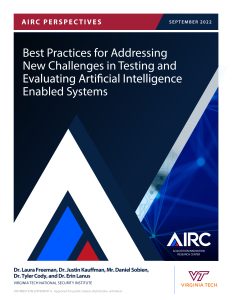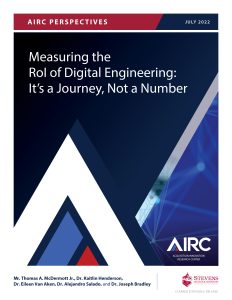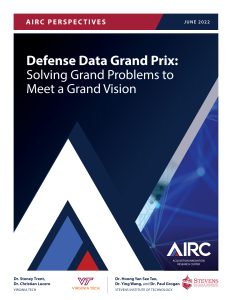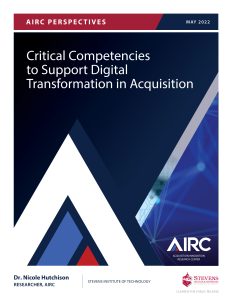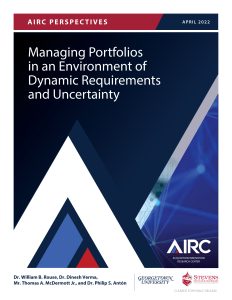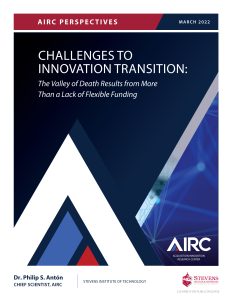AIRC Perspectives
PUBLISHED
September 2022
AUTHORS: Dr. Laura Freeman, Dr. Justin Kauffman, Mr. Daniel Sobien, Dr. Tyler Cody, and Dr. Erin Lanus
VIRGINIA TECH
The integration of artificial intelligence (AI) and statistical machine learning (ML) into complex systems exposes a variety of challenges in traditional test and evaluation (T&E) practices. As more decisions at varying levels are handled by AI-enabled systems (AIES), we need T&E processes that provide a basis for ensuring system effectiveness, suitability, and survivability.
PUBLISHED
July 2022
AUTHORS: Mr. Thomas A. McDermott Jr.1, Dr. Kaitlin Henderson2, Dr. Eileen Van Aken2, Dr. Alejandro Salado3, and Dr. Joseph Bradley4
STEVENS INSTITUTE OF TECHNOLOGY 1, VIRGINIA TECH 2, UNIVERSITY OF ARIZONA 3, OLD DOMINION UNIVERSITY 4
Systems engineering as a discipline has long had difficulty providing quantifiable evidence of its value (Honour 2004); DE transformation provides an opportunity to better measure its value. Transitioning from a document-based to a model-based approach is expensive, and organizations want to know if the effort and cost to adopt MBSE is worth it.
PUBLISHED
June 2022
AUTHORS: Dr. Stoney Trent1, Dr. Hoong Yan See Tao2, Dr. Ying Wang2, Dr. Paul Grogan2and Dr. Christian Lucero1
VIRGINIA TECH1, STEVENS INSTITUTE OF TECHNOLOGY 2
The DoD Data Strategy supports digital modernization and use of data at the speed and scale needed for efficiency and operational advantage. As the future workforce for the DoD, university students studying data science benefit from practical research challenges as part of their education. The Defense Data Grand Prix provides research opportunities that expose students to Defense Acquisition System challenges, decisions, and processes.
PUBLISHED
May 2022
AUTHOR: Dr. Nicole Hutchison
STEVENS INSTITUTE OF TECHNOLOGY
As the DoD transitions to digital engineering, there is a need to develop and maintain an acquisition workforce that is literate in model-based approaches, competent in digital models, methods, and tools, and understands digital artifacts across the acquisition lifecycle. This perspective paper explores those competencies and levels of proficiency needed to support digital transformation.
PUBLISHED
April 2022
AUTHORS: Dr. William B. Rouse1, Dr. Dinesh Verma2, Mr. Thomas A. McDermott, Jr.2, and Dr. Philip S. Antón2
GEORGETOWN UNIVERSITY 1, STEVENS INSTITUTE OF TECHNOLOGY 2
Organizations would like to have the flexibility and agility to address the uncertainty of both needs and technologies that results from challenges related to performance, organizational experience, supply chains, etc. This perspective paper outlines and illustrates new ways of thinking and allocating resources that organizations can adopt to address these challenges.
PUBLISHED
March 2022
AUTHOR: Dr. Philip S. Antón
STEVENS INSTITUTE OF TECHNOLOGY
Innovation is appealing and attractive, but it is a difficult and risky business. The Department of Defense (DoD) and the commercial sector have long struggled with transitioning and fielding innovative concepts and systems to operational use. Data show that very few innovations are successfully fielded. To tackle innovation, the DoD and its partners have created a range of organizations to pursue and apply innovative concepts.
